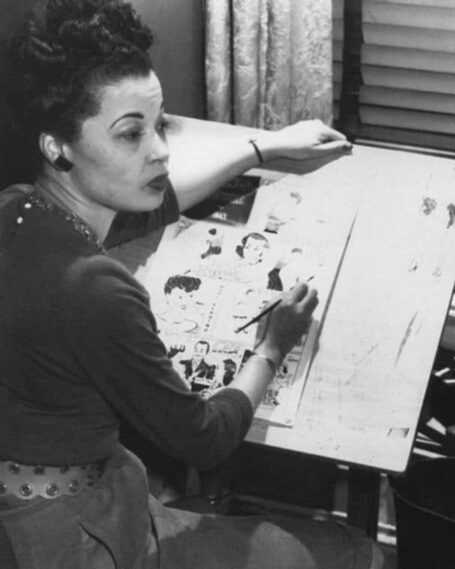Jackie Ormes - Trailblazing Cartoonist
Born: August 1, 1911, Pittsburgh, Pennsylvania
Died: December 26, 1985, Chicago, Illinois
Jackie Ormes was the first African American woman with a nationally published comic strip.
Jackie Ormes, born Zelda Jackson on August 1, 1911, in Pittsburgh, Pennsylvania, was the first African American woman to become a nationally recognized cartoonist. Her father died when she was young, so she was raised by her mother, Mary Brown Jackson. From a young age, Jackie loved to draw, and her talent helped her get her first job as a proofreader for the Pittsburgh Courier in 1930. She also wrote stories about police, court cases, and human-interest topics while pursuing her dream of cartooning.
Ormes made history with her first comic strip, Torchy Brown in Dixie to Harlem (1937–1938). The story followed a young woman who moved north from the South to perform in Harlem. The comic showed the struggles African Americans faced during the Great Migration and used humor and adventure to bring attention to racial inequality. Torchy Brown was brave, independent, and adventurous, showing women could be strong and make their own choices.
In 1942, Jackie moved to Chicago and worked for the Chicago Defender, a major Black newspaper. There, she created Candy, a short comic about a smart and funny housemaid. She also returned to reporting as a social columnist and special assignment reporter. Her most famous work during this time was Patty-Jo ‘n’ Ginger (1945–1956), an 11-year comic about two sisters. Patty-Jo, the younger sister, often commented on social issues like segregation, housing discrimination, and education. The comic also addressed important events, such as McCarthyism and the murder of Emmett Till, using humor and storytelling to highlight unfair treatment of Black Americans.
Jackie Ormes worked to show African Americans in a realistic and positive way. She avoided harmful stereotypes that made Black people look exaggerated or silly. Her comics also focused on women’s rights, featuring strong female characters who could stand up to harassment and make their own choices. In Torchy Brown: Heartbeats (1950–1954), she combined romance and humor with messages of strength and independence for women.
Her influence went beyond newspapers. In 1947, she worked with the Terri Lee Doll Company to create a doll based on Patty-Jo. This was one of the first Black dolls that was not a stereotype. It had combable hair, a painted face, and a wardrobe of dresses, shoes, and costumes. The doll gave African American children a positive role model and is now a valuable collector’s item.
Because of her political and social commentary, the FBI investigated Ormes for alleged communist ties from 1948 to 1958. Their file on her was 287 pages longer than they kept on Jackie Robinson. Despite this, Jackie continued to create comics that spoke out against injustice, using humor and art to educate readers and challenge unfair treatment.
Langston Hughes praised her work, saying he would miss “Jackie Ormes’s cute drawings” if stranded on a desert island. Her comics offered both fun and insight during difficult times. Over her career, Jackie broke barriers in cartooning and journalism and opened doors for Black artists and women in media.
Jackie married Earl Ormes in 1936, and though they lost their only child at age three, she continued to focus on her work and her community. She remained stylish, determined, and successful in a field dominated by men, setting a new standard for representation in comics.
Jackie Ormes passed away on December 26, 1985, in Salem, Ohio, at age 74. She left behind a lasting legacy as a pioneering cartoonist, journalist, and cultural icon. In 2014, she was posthumously inducted into the National Association of Black Journalists’ Hall of Fame, honoring her work to fight injustice, promote equality, and inspire generations with her art and stories.
References:
“Billy Ireland Cartoon Library & Museum Blog.” Billy Ireland Cartoon Library Museum Blog, library.osu.edu/site/cartoons/tag/jackie-ormes/.
Teutsch, Matthew. “Cartoonist Jackie Ormes’ Commentary on Black Life.” AAIHS, 8 Jan. 2018, www.aaihs.org/cartoonist-jackie-ormes-commentary-on-black-life/.
“Zelda ‘Jackie’ Ormes (1911-1985).” Black Past, www.blackpast.org/african-american-history/ormes-zelda-jackie-1911-1985/.
Key words:
Arts, Civil Rights, Courage, Creativity, Achievement, Selflessness, Challenge Injustices, Make a Difference
Explore ARTEFFECT projects about this Unsung Hero:
Jackie Ormes Artworks
View Discovery Award projects about this Unsung Hero:
Jackie Ormes - Discovery Award 2020
- Collections: Art Gallery, Unsung Heroes

